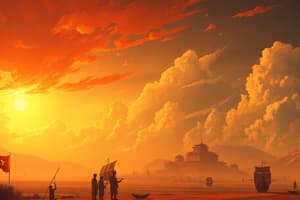Podcast
Questions and Answers
Why is understanding the evolution of cities crucial in studying India's historical development?
Why is understanding the evolution of cities crucial in studying India's historical development?
- To learn about the architectural styles of ancient cities
- To analyze the fashion trends of different dynasties
- To understand how societal shifts and cultural exchanges impacted India (correct)
- To study the agricultural practices prevalent in urban areas
Which of the following primary sources is NOT mentioned as important for developing writing skills in History Class 11?
Which of the following primary sources is NOT mentioned as important for developing writing skills in History Class 11?
- Coins
- Autobiographies
- Fossils (correct)
- Travel accounts
How do major metropolises such as Pataliputra, Multan, and Hyderabad contribute to India's historical narrative?
How do major metropolises such as Pataliputra, Multan, and Hyderabad contribute to India's historical narrative?
- By promoting modern architectural designs
- By introducing new languages to the region
- By influencing national growth through their functioning and changes (correct)
- By preserving traditional dance forms
What type of sources would help students contextualize and interpret historical events critically?
What type of sources would help students contextualize and interpret historical events critically?
Why are writing skills development important when studying India's historical past?
Why are writing skills development important when studying India's historical past?
How do coins and paintings contribute to understanding India's historical development?
How do coins and paintings contribute to understanding India's historical development?
What is one of the benefits of engaging with NCERT texts related to urbanization and city life according to the text?
What is one of the benefits of engaging with NCERT texts related to urbanization and city life according to the text?
Which skill is NOT mentioned as being fostered by the process of engaging with diverse source types related to urbanization and city life?
Which skill is NOT mentioned as being fostered by the process of engaging with diverse source types related to urbanization and city life?
Why is it important to cross-reference data from multiple perspectives when studying urbanization?
Why is it important to cross-reference data from multiple perspectives when studying urbanization?
Which factor does NOT contribute to India's urban landscape as mentioned in the text?
Which factor does NOT contribute to India's urban landscape as mentioned in the text?
How do trade routes like the Silk Road and maritime networks contribute to the development of trade and commerce?
How do trade routes like the Silk Road and maritime networks contribute to the development of trade and commerce?
What aspect of society is associated with studying caste hierarchies, gender roles, and religious identities in Indian societies?
What aspect of society is associated with studying caste hierarchies, gender roles, and religious identities in Indian societies?
Flashcards are hidden until you start studying
Study Notes
History Class 11: Exploring Writing and City Life through NCERT Textbooks
As you delve into Grade 11 History studies, you'll find yourself navigating through two interconnected themes—writing and city life—as they unfold within the pages of your National Council of Educational Research and Training (NCERT) textbooks. Let's uncover these aspects together, ensuring we grasp their significance and relevance to understanding India's historical development.
Historical Background: Indian Cities
The evolution of cities has played a pivotal role throughout Indian history, reflecting societal shifts, cultural exchanges, and changing economic patterns. In History Class 11, you will encounter numerous civilizations, dynasties, and empires whose histories are inextricably linked with the rise, fall, and transformation of major metropolises such as Pataliputra, Multan, Madurai, Ahmedabad, Jaunpur, Hooghly, Hyderabad, and Bombay. Understanding how these urban centers functioned, adapted to change, and influenced national growth is crucial when studying India's past.
Writing Skills Development
Developing writing skills while traversing through India's vast, multi-faceted past is extremely beneficial. As you engage with various primary sources like inscriptions, documentary records, coins, paintings, archaeological sites, literary works, travel accounts, and autobiographies, you begin to contextualize, analyze, and interpret them critically. This process fosters analytical thinking, critical reasoning, evidence-based argumentation, and logical problem-solving abilities. Additionally, using diverse source types encourages the formation of holistic perspectives by cross-referencing data from multiple perspectives.
Key Topics
Urbanization: Explore key concepts related to urbanization during ancient, medieval, colonial, and modern periods; identify underlying social, political, economic, demographic, technological, environmental factors contributing to India's urban landscape.
Trade and Commerce: Dissect the role of trade routes like Silk Road and maritime networks; understand how markets developed and expanded across different eras; investigate commercial practices, monetary systems, and trade organizations over time.
Cultural Exchanges: Delve deeper into interactions between people, ideas, and commodities due to migration, invasion, colonization, and globalization; appreciate the influence of foreign cultures upon local traditions and vice versa.
Social Structure and Change: Study caste hierarchies, occupations, gender roles, religious identities, and other facets associated with Indian societies; scrutinize evolutions of ideologies, beliefs, values, customs, norms, rituals, and practices.
Historical Perspective: Cultivate nuanced perspectives regarding complex issues concerning governance, power dynamics, philosophies, ideologies, conflicts, resistances, adaptations, innovations, achievements, failures, and consequences resulting from human actions and decisions throughout history.
Engaging with the above subtopics via NCERT texts will help foster your critical thinking skills and deepen your sense of understanding about history's intricate tapestry around Indian cities and written documents from decades gone by. After all, learning history isn't just about memorizing dates and events – it's also about developing crucial communication tools to help us better comprehend our world today.
Studying That Suits You
Use AI to generate personalized quizzes and flashcards to suit your learning preferences.



